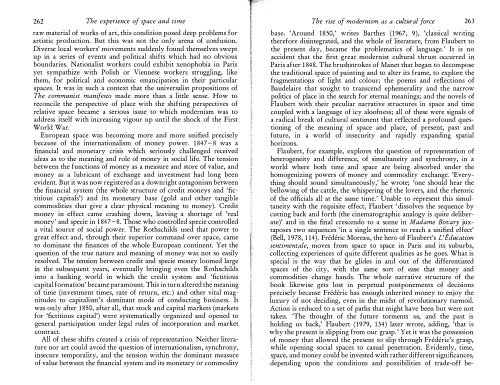The Condition of Postmodernity 13 - autonomous learning
The Condition of Postmodernity 13 - autonomous learning
The Condition of Postmodernity 13 - autonomous learning
Create successful ePaper yourself
Turn your PDF publications into a flip-book with our unique Google optimized e-Paper software.
262 <strong>The</strong> experience <strong>of</strong> space and timeraw material <strong>of</strong> works <strong>of</strong> art, this condition posed deep problems forartistic production. But this was not the only arena <strong>of</strong> confusion.Diverse local workers' movements suddenly found themselves sweptup in a series <strong>of</strong> events and political shifts which had no obviousboundaries. Nationalist workers could exhibit xenophobia in Parisyet sympathize with Polish or Viennese workers struggling, likethem, for political and economic emancipation in their particularspaces. It was in such a context that the universalist propositions <strong>of</strong><strong>The</strong> communist manifesto made more than a little sense. How toreconcile the perspective <strong>of</strong> place with the shifting perspectives <strong>of</strong>relative space became a serious issue to which modernism was toaddress itself with increasing vigour up until the shock <strong>of</strong> the FirstWorld War.European space was becoming more and more unified preciselybecause <strong>of</strong> the internationalism <strong>of</strong> money power. 1847-8 was afinancial and monetary crisis which seriously challenged receivedideas as to the meaning and role <strong>of</strong> money in social life. <strong>The</strong> tensionbetween the functions <strong>of</strong> money as a measure and store <strong>of</strong> value, andmoney as a lubricant <strong>of</strong> exchange and investment had long beenevident. But it was now registered as a downright antagonism betweenthe financial system (the whole structure <strong>of</strong> credit moneys and 'fictitiouscapitals') and its monetary base (gold and other tangiblecommodities that give a clear physical meaning to money). Creditmoney in effect came crashing down, leaving a shortage <strong>of</strong> 'realmoney' and specie in 1847-8. Those who controlled specie controlleda vital source <strong>of</strong> social power. <strong>The</strong> Rothschilds used that power togreat effect and, through their superior command over space, cameto dominate the finances <strong>of</strong> the whole European continent. Yet thequestion <strong>of</strong> the true nature and meaning <strong>of</strong> money was not so easilyresolved. <strong>The</strong> tension between credit and specie money loomed largein the subsequent years, eventually bringing even the Rothschildsinto a banking world in which the credit system and 'fictitiouscapital formation' became paramount. This in turn altered the meaning<strong>of</strong> time (investment times, rate <strong>of</strong> return, etc.) and other vital magnitudesto capitalism's dominant mode <strong>of</strong> conducting business. Itwas only after 1850, after all, that stock and capital markets (marketsfor 'fictitious capital') were systematically organized and opened togeneral participation under legal rules <strong>of</strong> incorporation and marketcontract.All <strong>of</strong> these shifts created a crisis <strong>of</strong> representation. Neither literaturenor art could avoid the question <strong>of</strong> internationalism, synchrony,insecure temporality, and the tension within the dominant measure<strong>of</strong> value between the financial system and its monetary or commodity<strong>The</strong> rise <strong>of</strong> modernism as a cultural force 263base. 'Around 1850,' writes Barthes (1967, 9), 'classical wntmgtherefore disintegrated, and the whole <strong>of</strong> literature, from Flaubert tothe present day, became the problematics <strong>of</strong> language.' It is noaccident that the first great modernist cultural thrust occurred inParis after 1848. <strong>The</strong> brushstrokes <strong>of</strong> Manet that began to decomposethe traditional space <strong>of</strong> painting and to alter its frame, to explore thefragmentations <strong>of</strong> light and colour; the poems and reflections <strong>of</strong>Baudelaire that sought to transcend ephemerality and the narrowpolitics <strong>of</strong> place in the search for eternal meanings; and the novels <strong>of</strong>Flaubert with their peculiar narrative structures in space and timecoupled with a language <strong>of</strong> icy alo<strong>of</strong>ness; all <strong>of</strong> these were signals <strong>of</strong>a radical break <strong>of</strong> cultural sentiment that reflected a pr<strong>of</strong>ound questioning<strong>of</strong> the meaning <strong>of</strong> space and place, <strong>of</strong> present, past andfuture, in a world <strong>of</strong> insecurity and rapidly expanding spatialhorizons.Flaubert, for example, explores the question <strong>of</strong> representation <strong>of</strong>heterogeneity and difference, <strong>of</strong> simultaneity and synchrony, in aworld where both time and space are being absorbed under thehomogenizing powers <strong>of</strong> money and commodity exchange. 'Everythingshould sound simultaneously,' he wrote; 'one should hear thebellowing <strong>of</strong> the cattle, the whispering <strong>of</strong> the lovers, and the rhetoric<strong>of</strong> the <strong>of</strong>ficials all at the same time.' Unable to represent this simultaneitywith the requisite effect, Flaubert 'dissolves the sequence bycutting back and forth (the cinematographic analogy is quite deliberate),and in the final crescendo to a scene in Madame Bovary juxtaposestwo sequences 'in a single sentence to reach a unified effect'(Bell, 1978, 114). Frederic Moreau, the hero <strong>of</strong> Flaubert's L' Educationsentimentale, moves from space to space in Paris and its suburbs,collecting experiences <strong>of</strong> quite different qualities as he goes. What isspecial is the way that he glides in and out <strong>of</strong> the differentiatedspaces <strong>of</strong> the city, with the same sort <strong>of</strong> ease that money andcommodities change hands. <strong>The</strong> whole narrative structure <strong>of</strong> thebook likewise gets lost in perpetual postponements <strong>of</strong> decisionsprecisely because Frederic has enough inherited money to enjoy theluxury <strong>of</strong> not deciding, even in the midst <strong>of</strong> revolutionary turmoil.Action is reduced to a set <strong>of</strong> paths that might have been but were nottaken. '<strong>The</strong> thought <strong>of</strong> the future torments us, and the past isholding us back,' Flaubert (1979, <strong>13</strong>4) later wrote, adding, 'that iswhy the present is slipping from our grasp.' Yet it was the possession<strong>of</strong> money that allowed the present to slip through Frederic's grasp,while opening social spaces to casual penetration. Evidently, time,space, and money could be invested with rather different significances,depending upon the conditions and possibilities <strong>of</strong> trade-<strong>of</strong>f be-
















